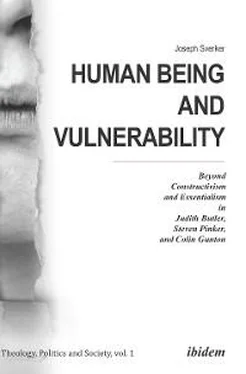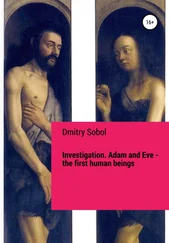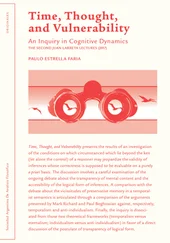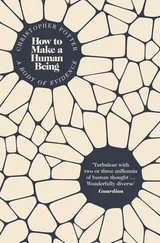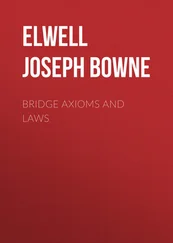Butler might still belong within the range of a strong constructivism, 29but this needs to be developed in the next chapter since Butler’s critique of radical constructivism is closely linked with questions of the human subject. 30Even if Butler cannot be seen to represent all types of social constructivism, she is helpful for understanding problems and potentials with a social constructivist view of the human being in relation to biologist anthropologies. And considering that Butler challenges the division between sex as natural and gender as cultural, and attempts to move beyond the polarization between biology and the social herself, it is of interest to engage with her argument.
In contrast to “social constructivism,” the term “biologist essentialism” has no real wide currency. I use it as a compound of two concepts, “biologism” on the one hand and “essentialism” on the other. Cultural critic Sara Arrhenius defines “biologism” as the “confident conviction that biology can encompass the whole human being.” 31Being a worldview, biologism makes wider claims than the scientific field of biology. The distinction from the science of biology is important since it clarifies biologism as a framework within which the human being should be understood. It is not then a case of “science versus the humanities,” but rather two discourses that are compared when social constructivism and biologism confront each other.
“Essentialism” as a term is traditionally connected with the question of the soul as the essence of the human being. However, as philosopher Elizabeth Grosz points out, essentialism can also be seen as the attribution of fixed essences and can therefore be connected with biologism. 32As philosopher of science Susan Oyama points out, essentialism enters in many disguises and in biology it is found in the assumption of innate traits. Oyama writes correctly that
“[i]nnate” characters are thought to be internally generated and trebly static: immutable in individuals, uniform across generations, and/or universal in individuals. They are attributed to genetic programs “for” those features, and are frequently assumed to be either inevitable or changeable only at heavy cost. 33
Thus, there is an innatist assumption in exploring internal traits of a universal human psyche or nature. 34This innatist view of the gene is by no means the only view presented by biologists, 35but it is influential within evolutionary psychology.
Evolutionary psychology, which owes much to John Tooby and Leda Cosmides, and which Pinker shares, is worked out in opposition to a particular understanding of the social sciences. Tooby and Cosmides argue that the starting point of the Standard Social Science Method (SSSM) is to state that all is culture, culture is the autonomous agent of change. 36Against this is proposed a clear actor who acts upon culture, rather than is acted upon by culture.
Further, essentialism is apparent in another main principle of evolutionary psychology. Evolutionary psychology proposes that the human genome evolved over a long period of time in the conditions of the Pleistocene era, 37but went through a “population bottleneck […] fairly recently in evolutionary history,” as Steven Pinker puts it. 38After that “population bottleneck” there was no more significant change in the human genome to alter human psychology. Even if human nature is not unchangeable evolutionarily speaking, it is nonetheless assumed that the change is so slow in terms of the essential constituents of the universal human nature that it is insignificant for all important purposes. The essence of human nature is found in the genes of which the human body is the “vehicle.” 39
To sum up, evolutionary psychology is essentialist in that all human beings share a particular and unchanging human nature. It is a biologist essentialism since it assumes that human nature is based on a shared human genome. And, from the vantage point of genes as “replicators” and the human body as “carriers” of the gene, evolutionary psychology also relies on a dualism, as theologian Conor Cunningham has argued convincingly. 40
On a final note, biologism as well as essentialism, in certain traditions, are decidedly pejorative terms. It is not my intention to use them with any such undertones here. Also, if I were to transfer the terms “strong” and “weak” used for constructivism, then biologist essentialism is a weak essentialism since the proposed essence is not ontologically unchangeable or of a different essence from the body. 41
Interestingly, just like Butler, Pinker argues that his understanding of the human being renders the distinction between nature and nurture obsolete. Indeed, some argue that this is an inherent feature of evolutionary psychology itself. 42My point, however, is that while this is a positive development in biology, in the end, just as with Butler, there are problems, but also indeed useful insights in Pinker’s accounts of the human being. What about theological anthropology then?
As theologian Michelle Voss Roberts succinctly puts it, treating “topics such as human nature and purpose, freedom and sin, and difference and gender, this doctrine [theological anthropology] deals with what it means to be a human being in relation to our divine source.” 43The inclusion of the divine distinguishes theological anthropology from social constructivism and biologist essentialism. This distinctly non-secular starting point of theological anthropology entails, as suggested by John Webster, “the dogmatic depiction of human identity as it is shaped by the creative, regenerative and glorifying work of the triune God.” 44
But theological anthropology cannot completely be separated from its secular counterparts. For as theologian Wolfhart Pannenberg points out, theology and anthropology are inseparable and theologians “must begin their reflection with a recognition of the fundamental importance of anthropology for all modern thought and for any present-day claim of universal validity for religious statements.” 45For Pannenberg, this is not to say that theology is anthropology, the argument famously put forward by Ludwig Feuerbach, 46but rather that anthropology is a central concern for theology. 47
The theological anthropology that is of most interest here is what could be called a “relational” anthropology. 48The meaning of this concept will be expounded in much greater detail in chapter 4 and also part II, but can in brief terms be said to be the view that the human being becomes who she centrally is only in and by the relations in which she finds herself.
The starting point for this anthropology is often an interpretation of the Genesis creation account together with a “social” understanding of the Trinity, but more recently there has been much critique of “social trinitarianism(s).” 49Further, Marc Cortez, a main voice within theological anthropology today, sees some problems with a relational interpretation of Genesis 1 and sides therefore more hesitantly with a relational theological anthropology. Nevertheless, he concludes that “despite criticisms about the exegetically unfounded nature of the relational imago , it remains a viable candidate for understanding this important concept,“ 50if, as Cortez argues, theological anthropology is founded on christology rather than by analogy with the doctrine of the Trinity. 51This point, emphasized by many theologians also before Cortez and which is the “traditional” route to theological anthropology, 52is an important argument for this book.
Gunton rarely refers to the nature/nurture question explicitly but pays much attention to what he sees as a confused relationship between culture and nature in Modernity and late Modernity. 53Gunton views this as a theological problem due to Modernity’s, as he states, “displacement of God.” 54While Gunton’s critique of Modernity will be challenged below, certain aspects of his theological engagement with culture are helpful.
Читать дальше
